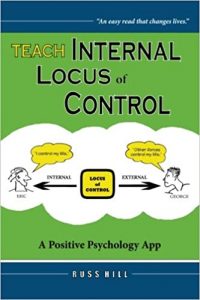Which Health Factor Is Outside Your Individual Control?
 How much command exercise we really have over our lives?
How much command exercise we really have over our lives?
Many psychological theories accept attempted to reply this question. One such explanation is the locus of control.
Locus of control is a concept created past psychologist Julian Rotter (1954). Rotter was interested in social learning and why some behaviors stick while others languish.
Locus of control is an underlying structure of Rotter's social learning theory, but as a standalone theory, it has had significant applications in didactics, health, and clinical psychology. It has driven inquiry in motivation, learning, depression, and addiction.
In this article, nosotros look at the research into locus of command and offer seven worksheets and two recommended books to provide a comprehensive overview of this topic.
Before you proceed, we thought you might like to download our three Resilience Exercises for free. These engaging, scientific discipline-based exercises will help you deal effectively with difficult circumstances and give yous the tools to improve the resilience of your clients, students, or employees, no thing the situations they have to face.
What Is the Locus of Control in Psychology?
The concept behind locus of control is fairly simple. Our lives are total of actions and outcomes. Each of us will ascribe a sure locus of control over these outcomes. The theory states that we will place the location, or locus, either externally or internally.
If nosotros place the locus of control externally, nosotros are likely to arraign the outcome on fate, luck, or happenstance. If we place the locus of control internally, we are likely to believe our own actions determine the result.
Rotter (1966) stated that where we place that locus volition either reinforce or punish our actions. An internal locus of control volition lead to a reinforcement of that behavior, and the behavior will go on. An external locus of control will cause the behavior to extinguish – why would nosotros continue to try if the result is outside of our control?
Nevertheless, Rotter (1975) was careful to state that we should anticipate this as a continuum between external and internal, rather than an either/or categorization. In general, good for you adults rarely believe that everything is either entirely out of our control or entirely within it.
In fact, individuals who employ a alloy of both internal and external loci in their reasoning report higher levels of happiness (April, Dharani, & Peters, 2012).
Internal vs External Locus of Control: 3 Examples
 Here are three examples of how our locus of control may influence the way nosotros view an outcome and the behaviors that follow.
Here are three examples of how our locus of control may influence the way nosotros view an outcome and the behaviors that follow.
Nosotros will telephone call these two people Isaac the Internalizer and Everett the Externalizer.
- Piece of work
Isaac and Everett are both up for a promotion.
Isaac, with his internal locus of control, believes that his hard work will get him the promotion. He also believes that if he doesn't go it, he just needs to work harder.
Everett, on the other hand, feels that the promotion is largely outside of his control and that external forces, whether they are merely chance or the boss'south whims, will make up one's mind whether he will get the promotion. Although he may not work every bit hard to obtain the promotion, if he doesn't become information technology, Everett may be easier on himself than Isaac.
- School
There is a big test coming up, and Isaac and Everett are at the library.
Isaac believes his score will directly reflect the amount of studying that he did, and since he wants a good grade, he applies himself and studies hard.
Everett has an external locus of control and believes that the grade may well reflect the instructor'southward bias. He believes that studying too hard is a waste product of time.
- Health
Isaac's physician tells him he has the potential to develop Type II diabetes.
Isaac has heard that it's possible to control this outcome with diet, so he decides to cutting out all sugar and try to eat more vegetables.
Everett gets the same diagnosis, but he believes that it'due south all genetic. He comes from a family unit with a history of diabetes and feels that the outcome is inevitable. He doesn't endeavor to modify his diet because he doesn't call back it will make any difference.
Popular Theories Well-nigh the Concept
Following is a give-and-take of how locus of control relates to other psychological theories. Two theories that are related but differ in subtle ways include self-efficacy and attribution style.
Some other of import theory is personality and how it affects our locus of control. And finally, in order to stay relevant, the theory of locus of control must take into consideration cultural factors, such as how oppression and bigotry may affect our perception of control.
Self-efficacy theory
Self-efficacy, a concept proposed past social psychologist Albert Bandura (2010), is the measure of how capable an private feels well-nigh achieving their goals.
Bandura showed that no thing how talented a person may be, if they practice not believe they are capable, this belief will accept a strong effect on their ability to succeed. Individuals with loftier cocky-efficacy volition have higher levels of persistence and give upwardly less easily than those with low levels of self-efficacy (Schunk, 1990).
Self-efficacy and locus of control are related, but they are not the same. An individual with an internal locus of control may feel their health outcomes are caused by their behavior, but they may not experience capable of achieving their goal.
For example, a person may know that they tin increase musculus mass past doing certain exercises but may experience that they won't succeed because they don't have the noesis to create an practise program. Also, locus of control includes an appraisal of the surrounding surroundings, whereas self-efficacy is ultimately a self-cogitating construct.
Attributional styles & locus of control
Locus of command is a theory of learning. Importantly, this means that the behavior in question, whether it's sticking with an exercise plan or studying for a test, will either exist reinforced or halted based on the perceived locus of control.
For example, if a person finds a $twenty bill on the street, information technology is unlikely that they will continue to return to that street again and again looking for more money; instead, they perceive that the locus of command backside finding the money was an external event, namely adventure.
Attributional style is also a theory of behavior that includes locus of control as one of iii potential causes (Weiner, 1986). Attribution theory includes other factors – whether the cause is global or specific, stable or unstable – in improver to whether the individual perceives that they have control over information technology.
A global attribution means that the person believes the cause of the result is consequent across all contexts. A specific attribution is simply the opposite: it simply happens in a particular context. Whether an event is stable or unstable describes if it is consequent across time or only owing to a unmarried signal in time.
Weiner (1986) gives the examples that ability is stable and internal, whereas mood is unstable and internal. Job difficulty may exist seen as stable and external, while luck is seen every bit unstable and external. The perceived amount of control over each of these may vary from person to person.
Similar to locus of control, our attribution style will affect our behavior. Imagine, for instance, that your brother is visiting, and he blows up at yous over something minor, yelling and storming out.
If yous attribute his behavior to internal, stable, and global causes, you perceive that your brother's personality causes him to act this way in all contexts and all the time. If you aspect his behavior to internal but unstable and specific causes, you may remember that he is in a foul mood, that this is out of character, and something must have prepare him off.
Given these two appraisals of the aforementioned state of affairs, we will behave differently. We are less likely to exist forgiving if we feel the person has control over their behavior. We may exist more likely to let information technology go if we remember it'south a erstwhile issue rather than something that happens no matter the situation.
Locus of control & personality theories
Much of the research into locus of control and how it relates to personality has been in the realm of piece of work satisfaction and wellness outcomes (Strauser, Ketz, & Keim, 2002; Spector & O'Connell, 1994).
The Large V personality traits (emotional stability, extraversion, openness, agreeableness, and conscientiousness) have each been shown to have varying levels of touch on outcomes in these realms. These traits have been examined for their human relationship with locus of control and how the interaction may affect work-life and health (Ng, Sorensen, & Eby, 2006; Boysan & Kiral, 2017; Mutlu, Balbag, & Cemrek, 2010).
In full general, emotional stability (formerly known every bit neuroticism) and conscientiousness have strong positive relationships with an internal locus of control. Believing that their behavior contributes straight to the outcome of a state of affairs will naturally pb to difficult work if the individual also has the desire.
Conversely, those with an external locus of control have been shown to have higher levels of stress and even depression (Benassi, Sweeney, & Dufour, 1988). Information technology stands to reason that if someone feels they are at the mercy of outside forces and their life is non in their hands, this could lead to anxiety and learned helplessness.
The idea of learned helplessness and its relationship to an external locus of control was introduced by Martin Seligman (1975).
He avant-garde the hypothesis that individuals with low accept a country of mind that reflects a type of helplessness, meaning that they don't believe that their actions will have whatever positive outcome on the outcomes of their lives. This type of thinking may reflect an external locus of control, because they have little religion in themselves (Abramson, Seligman, & Teasdale, 1978).
Cultural humility and locus of control
A gene that has not been addressed much in literature is how an individual'south locus of command may be shaped by systems of injustice, like institutionalized racism and gender discrimination.
An external locus of control is often described as attributing outcomes to such things as luck, fate, or gamble. But what if an individual doesn't become a promotion because their boss is discriminating against them? What if a couple cannot get a loan to buy a house considering of their sexual orientation or race?
For oppressed or marginalized groups, in that location is an objective threat to their power to control the outcomes of their lives. Their perceived differences in loci of control may reflect these systems of oppression, rather than a lack of cocky-determination (Sue, 1978).
Enquiry into locus of command and its effects on an individual's issue has encouraged programs that assistance people motion toward a greater feeling of internal control (Twenge, Zhang, & Im, 2004).
It'south generally believed that those with higher levels of internal locus of control too tend to have better outcomes (Rotter, 1966; Lefcourt, 1982; Twenge et al. 2004). Only before we utilize blanket programs that care for all individuals the aforementioned, it is important to recognize that these programs often overlook systemic bug that may truly affect an private'southward level of command (Brown, Rosnick, & Segrist, 2017).
3 Fascinating Research Findings

Health and motivation
During the COVID-19 pandemic, experts encouraged social distancing every bit a mode to mitigate the spread of the coronavirus.
Itani and Hollebeek (2021) found that an internal locus of control positively correlated with a willingness to social altitude, showing that if individuals believed that their ain behavior had a positive outcome on their health, they were more willing to comply with recommendations.
Clinical psychology
Globally, 5.one% of women and three.half dozen% of men feel depression, and 4.6% of women and two.six% of men experience feet disorders (Earth Wellness Arrangement, 2017).
Churchill, Munyanyi, Prakash, and Smyth (2020) examined longitudinal information of these gender disparities in mental health and found an intriguing outcome. The researchers examined the scores of over 20,000 Australians on measures of mental health and locus of control.
They showed a significant gender gap in mental wellness, consistent with the Globe Health Organization findings. They also showed that women were more likely to have an external locus of control than men. Finally, through regression analysis, they could demonstrate that a unit increase toward internal locus of control would take a more significant consequence on this gender gap than any other variable, including employment and matrimony status.
Environs
Locus of control has been shown to be a key factor in pro-environmental behavior (Peyton & Miller, 1980). Chiang, Fang, Kaplan, and Ng (2019) took this finding a pace farther and examined the relationship betwixt ecology actions, locus of control, and emotional stability.
They found that the personality factor of emotional stability positively influenced pro-environmental beliefs. They likewise showed through structural equation modeling that emotional stability may exist a mediator between an internal locus of command and pro-environmental behavior.
High levels of patience and calm (positive levels of emotional stability) may lead to a greater level of internal locus of command and feelings of hopefulness toward helping the planet.
7 Worksheets & Exercises for Psychologists
To aid clients sympathize how they perceive control, we have created several worksheets.
Worksheets for children
I Can/Can't Control
This worksheet is a checklist that helps children larn to identify things they tin can command and things they tin't.
Out of Command or In Control
In this worksheet, children are presented with a list of reactions they might have, such as hit, pacing, and talking with friends. This do requires them to sort these reactions into 3 columns: Out of Control, In Control, or Both.
Self-Command Spotting Activity
This worksheet gives the child viii dissimilar activities to place and sort as either self-control or not self-control.
For teenagers
What Makes Me Angry
This worksheet helps guide teenagers to see that it is not the person or upshot that makes them aroused, just their thoughts instead.
Control in relationships
Shifting Codependency Patterns
This worksheet for relationships outlines examples of denial, low self-esteem, compliance, avoidance, and control. For each of these patterns, the worksheet provides examples of a codependent reaction and a secure reaction.
Command in life
Control–Influence–Accept Model
In this exercise, clients are asked to present a challenging situation and then assess what can be controlled or influenced, and what needs to be accepted.
Our 2 Favorite Books on the Topic
1. Choice or Gamble: Understanding Your Locus of Control and Why It Matters – Stephen Nowicki

Clinical psychologist Dr. Nowicki has spent his career investigating and writing about locus of command.
This self-help volume guides readers to place their own locus of command and how it may be influencing their lives. This is a skillful choice for those who would like to dive into the enquiry and discover out how information technology applies to their ain lives.
Find the book on Amazon.
2. Teach Internal Locus Of Control: A Positive Psychology App – Russ Colina

Because an internal locus of command has been strongly associated with greater wellbeing and more success in work and school, information technology is no surprise that people want to know if there is a style to become more than of an internalizer.
This volume teaches a 6-step behavioral strategy that will aid teach learners how to become more "internal" and experience that they take more than control over their lives.
Notice the book on Amazon.
A Have-Dwelling Bulletin
Locus of control began as an caption for why some behaviors flourish and grow, while others never take seed.
This theory has had a far-reaching touch in the fields of developmental psychology, wellness psychology, clinical psychology, and more. Now, it is now seen as an important building cake of self-evaluation, a multi-dimensional construct under which self-efficacy, self-esteem, and emotional stability besides lie.
When we aspect an result in life to external forces across our command, we may notice ourselves feeling helpless to enact change.
But the truth of our level of control oftentimes resides only in our perception of it. Between this real and perceived level of control is a choice to believe in ourselves and our ability to change our fate.
If we believe in our power to control our life, nosotros will exist more likely to take chances and feel more confident in our ain autonomy. This conventionalities may be taught at an early age, merely it can besides be shaped throughout life. Through subtle changes of mindset, we can begin to feel more in control of our future.
We promise you enjoyed reading this article. Don't forget to download our iii Resilience Exercises for free.
- Abramson, 50. Y., Seligman, G. E., & Teasdale, J. D. (1978). Learned helplessness in humans: critique and reformulation. Journal of Abnormal Psychology, 87(one), 49–74.
- Apr, K. A., Dharani, B., & Peters, Thousand. (2012). Bear upon of locus of control expectancy on level of well-being. Review of European Studies, 4, 124–137.
- Bandura, A. (2010). Self-efficacy. In I. B. Weiner & West. B. Craighead (Eds.), The Corsini encyclopedia of psychology (4th ed.). John Wiley & Sons.
- Benassi, V. A., Sweeney, P. D., & Dufour, C. L. (1988). Is in that location a relation between locus of control orientation and low? Periodical of Aberrant Psychology, 97(iii), 357–367.
- Boysan, M., & Kiral, E. (2017). Associations betwixt procrastination, personality, perfectionism, cocky-esteem and locus of command. British Journal of Guidance & Counselling, 45(3), 284–296.
- Brown, D. L., Rosnick, C. B., & Segrist, D. J. (2017). Internalized racial oppression and higher didactics values: The mediational function of bookish locus of control among college African American men and women. Journal of Black Psychology, 43(4), 358–380.
- Chiang, Y. T., Fang, W. T., Kaplan, U., & Ng, E. (2019). Locus of control: The mediation effect betwixt emotional stability and pro-environmental behavior. Sustainability, 11(3), 820.
- Churchill, S. A., Munyanyi, M. East., Prakash, Thousand., & Smyth, R. (2020). Locus of control and the gender gap in mental health. Periodical of Economic Behavior & Organization, 178, 740–758.
- Loma, R. (2011).Teach internal locus of command: A positive psychology app.Will to Power Press.
- Itani, O. S., & Hollebeek, 50. D. (2021). Consumers' health-locus-of-control and social distancing in pandemic-based e-tailing services. Journal of Services Marketing.
- Lefcourt, H. One thousand. (1982). Locus of control: Current trends in theory and research (2nd ed.). Lawrence Erlbaum Associates.
- Mutlu, T., Balbag, Z., & Cemrek, F. (2010). The part of self-esteem, locus of control and big five personality traits in predicting hopelessness. Procedia-Social and Behavioral Sciences, 9, 1788–1792.
- Ng, T. Due west., Sorensen, 1000. L., & Eby, 50. T. (2006). Locus of control at work: a meta‐analysis. Periodical of Organizational Behavior, 27(eight), 1057–1087.
- Nowicki, S. (2016).Choice or adventure: Agreement your locus of control and why it matters.Prometheus.
- Peyton, R. B., & Miller, B. A. (1980). Developing an internal locus of control as a prerequisite to ecology action taking. In A. Sacks (Ed.), Current issues Half-dozen: The yearbook of environmental education and environmental studies (pp. 173–192). ERIC/SMEAC.
- Rotter, J. B. (1954). Social learning and clinical psychology. Prentice Hall.
- Rotter, J. B. (1966). Generalized expectancies for internal versus external command of reinforcement. Psychological Monographs, lxxx, 1–28.
- Rotter, J. B. (1975). Some bug and misconceptions related to the construct of internal versus external control of reinforcement. Journal of Consulting and Clinical Psychology, 43(1), 56–67.
- Schunk, D. H. (1990). Goal setting and self-efficacy during self-regulated learning. Educational Psychologist, 25(1), 71-86.
- Seligman, M. E. P. (1975). Helplessness: on low, development, and death. W. H. Freeman.
- Spector, P. E., & O'Connell, B. J. (1994). The contribution of personality traits, negative affectivity, locus of command and Type A to the subsequent reports of task stressors and job strains. Journal of Occupational and Organizational Psychology, 67(1), one–12.
- Strauser, D. R., Ketz, G., & Keim, J. (2002). The relationship between self-efficacy, locus of control and work personality. Journal of Rehabilitation, 68(1), 20–26.
- Sue, D. W. (1978). Eliminating cultural oppression in counseling: Toward a full general theory. Journal of Counseling Psychology, 25(five), 419–428.
- Twenge, J. M., Zhang, L., & Im, C. (2004). It's across my control: A cantankerous-temporal meta-analysis of increasing externality in locus of control, 1960-2002. Personality and Social Psychology Review, eight(3), 308–319.
- Weiner, B. (1986). An attributional theory of motivation and emotion. Springer-Verlag.
- World Health Organisation. (2017). Low and other mutual mental disorders: Global health estimates. Author.
Which Health Factor Is Outside Your Individual Control?,
Source: https://positivepsychology.com/internal-external-locus-of-control/
Posted by: woodwhilest.blogspot.com


0 Response to "Which Health Factor Is Outside Your Individual Control?"
Post a Comment